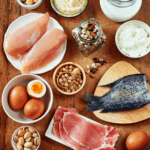Sufficient protein consumption is critical for health and longevity. Too little protein in the diet leads to low muscle mass, which in turn is strongly associated with increased mortality risk. We have frequently pointed out why the Recommended Dietary Allowance (RDA) of 0.8 grams of protein per kilogram (kg) of body weight per day is too low, and my team generally recommends a daily intake of at least twice that amount – around 1.6 to 2 grams of protein per kg of bodyweight. Many active individuals and those seeking to build muscle aim for even higher levels of protein intake,1 raising the question: is there such a thing as too much?
Mechanistic data on the effects of protein on cellular signaling pathways have led to a hypothesis that excess protein intake promotes the development and progression of cancer, an idea that has been widely spread by advocates for protein restriction. However, the fact that a given hypothesis is mechanistically plausible does not necessarily mean that it is true, and in evaluating how protein intake impacts cancer risk, we must adopt a wider perspective. While randomized trials addressing this question are lacking, combining human epidemiological studies with a closer look at mechanistic studies paints a more nuanced picture of the relationship between protein and cancer.





Many of the protein studies measure protein intake as a percentage of calories. But protein is available from several low calorie (and low fat) sources. For instance, powdered whey can offer 30 grams of protein, and fewer than 150 calories. Beef jerky may be another example. And note that unlike many sources of protein, both jerky and whey maybe extremely low in fat. Measuring as a percentage of calories can be distorting reality.
Instructive and germane
Most people get enough protein, but many lack the ability to process that protein into lean muscle mass. Research indicates that HMB (Beta-Hydroxy Beta-Methylbuterate) supplementation will promote protein synthesis and protect lean muscle mass.
How would you explain the “blue zones” eating pattern that is generally low protein, and specifically very low in animal based protein, and yet they have a very low chronic disease burden, and generally live longer. Obviously it is not only due to their eating patterns, but still it is a common characteristic of all the 5 blue zones
For those who have had cancer, or still have circulating cancer cells, it is advised to eat a lower protein diet, using legumes, mushrooms, tofu, nuts, anchovies, egg yolks for proteins. Not an expert on protein, I do know from first hand experience working in Africa, that by simply adding peanuts, or peanuts sauces, to cassava and plantain — kwashiorikor will be prevented in African babies. And younger children. So certain nuts, seeds, etc. are an important source of protein.
Loved this article!
When are you going to compare high protein with high carb?
I feel like obesity is the 800-900 pound elephant in the room…. is obesity bad for us? At age almost 78 I remember how kids were rarely obese and now it’s the norm…
High carb standard American diet seems way worse than high protein?
I’d love to see a podcast with Valter Longo on this topic and on fasting.
I second this motion – if that helps to motivate such a podcast.
Great article, as usual. I did have a couple of hypothesis spring to mind on the first study discussed:
If we generally have a reduction in the amount of protein which we can absorb as we age, then perhaps the mechanism for favoring a higher percentage of calories from protein in the >65 years-old group is actually from “restricting” calories through that poorer absorption?
If we consider possible carcinogenic agents which may accompany particular sources of protein either from the source itself or from the way it is cooked, then perhaps the mechanism for favoring a higher percentage of calories from protein in the >65 years-old group is actually that by achieving cancer-free survival to that age threshold makes you more likely to succumb to other vectors of mortality than those directly associated with protein intake? (Conversely, the higher protein intake earlier in life potentially results in earlier cancers due to carcinogen exposure.)
Question: I am 77 years old, and lift weights and do zone 2 exercise 5 days/week. I weigh 160 lbs., so per this article I should consume 115-145 grams of protein per day. I get about 15g at breakfast, about 25g in my after-exercise smoothie, about 15g at lunch and another 15g at dinner as part of an overall healthy diet. This total of about 70g of protein with vegetables and fruit is all I can figure out how to consume. I have gained muscle since being on this exercise/eating plan, and my weight is steady. Should I still try to get to 115g+ of protein? How could I do it?